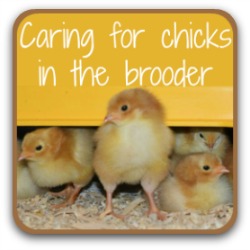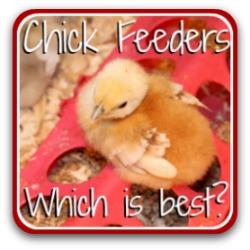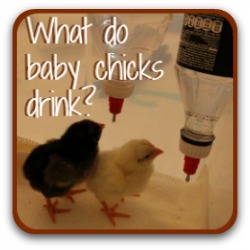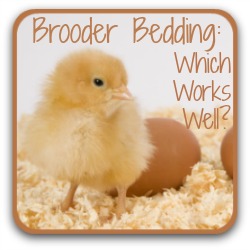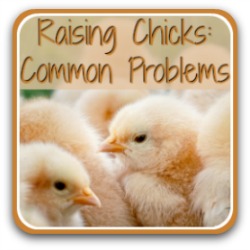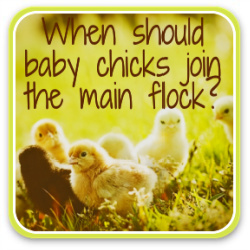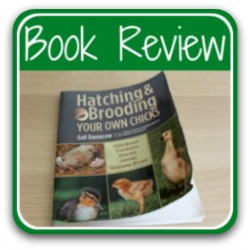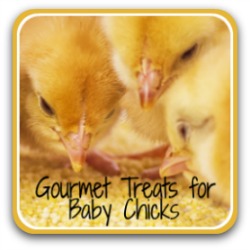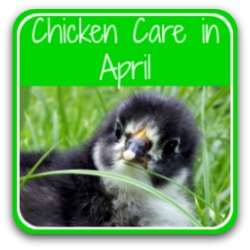What do baby chicks eat?
So you're about to have baby chickens but you're not sure what feed they should eat?
Chickens eat different food at different life stages – and working out which to feed at what age can be very confusing.
In this article we'll cover everything you need to know about feeding baby chicks, from food they should eat immediately after hatching, to exactly what kind is best for them, and how to feed it.
What do chicks eat immediately post hatch? Nothing!
Technically, baby chicks don't need anything to eat or drink for about 48 hours after they've hatched. That's because they are sustained by the yolk of the egg, which they absorb into their body just before they break through the shell.
It's how chicks can be sent by post from hatcheries with nothing to eat or drink in their container.
So don't worry that your newly hatched chicken's still in the incubator without food or drink while she dries out and fluffs up. She'll be fine for now.
I generally leave my chicks to dry out in the incubator for between 6 and 12 hours after they've hatched. Once they're dry, fluffed up and reasonably active, into the brooder they go.
It's at that point you'll need to introduce food and drink. For more about drink, see this link.
If you purchase a product through links on this page, I receive a small commission at no extra cost to you. I only recommend products I have purchased or would purchase myself and which I genuinely believe would benefit you. To learn more please see my disclosure policy.
What kind of feed should chicks eat?
Chicks grow at an amazing rate in the first few weeks of life, and it's critical for their healthy development that they eat a properly balanced chick food, known as "starter feed", available either as crumb, mash or pellets.
It's very important that you buy the right kind of feed for baby chicks. Don't try to give them the same food as your adult flock: it's too high in calcium which can cause irreversible kidney damage, and too low in protein which new hatchlings, growing at an explosive rate, need.
 One of my hatches tucking into their chick crumbs at Day 2 in the brooder.
One of my hatches tucking into their chick crumbs at Day 2 in the brooder.Commercially produced starter feed is balanced to contain exactly what a chick needs to eat for the first several weeks. Look for a good brand, preferably organic and non-GMO, which contains between 15% and 21% protein.
Check whether it's bulked out with soy and corn and, if you can, buy a feed that's unprocessed whole grains. It's more natural and healthier.
The best and least expensive place to buy it is your local feed store, but if you can't get there for any reason, you can buy online.
The brand I recommend if you're in the US is this one, which is both organic and guaranteed GMO free, has exactly the right amount of protein, is soy and corn free and is milled by a small, family run company.
What do chicks eat: crumbs, mash or pellets?
This choice can be confusing when you first keep chicks.
Chick mash: this is the most finely ground of the choices you'll be faced with. Its tiny granules can look like a powder. It's most beneficial for very young chicks, especially if they're weak or unwell, since they're very easily digested.
- The downside is that they are very easily kicked out of feeders.
Chick crumbs: these come somewhere between the size of mash and pellets. They're not ground as finely as mash, but still small enough for chicks to be able to digest easily.
- Use crumbs as your chicks grow – I change from mash to crumb from about three weeks.
Pellets: these are much larger pieces of compressed food. They're easy to handle, and create much less waste than mash, slightly less than crumbs.
- If you're going to feed your adults on pellets, change to these at around six or seven weeks.
I tend to use chick crumbs from three or four weeks right until they move to a grower feed after around eight weeks.
Can you make your own chick feed?
Some people do. I don't recommend it for the reason I've stated above: it's really very important for the chick's development that she eats a properly balanced feed with exactly the required amount of protein, and low in calcium.
To try to provide that yourself is a big ask. In my view, it's better to pay for a high quality feed that you and your chicks can rely on.
Should chicks eat medicated or non-medicated food?
I've never fed my chicks a medicated feed, and if you keep your hatchlings in a clean brooder, regularly clear away their droppings, and make sure they have sufficient space, there is really no need.
If you've bought chicks from a hatchery you need to check whether they have been given a vaccination against coccidiosis. If they have, you should definitely not offer any form of medicated feed.
It won't necessarily harm them, but it will nullify the vaccine.
When is medicated food necessary?
 Commercially hatched chicks have medicated feed to prevent the spread of disease. Backyard flocks should not need it.
Commercially hatched chicks have medicated feed to prevent the spread of disease. Backyard flocks should not need it.Chicks who are hatched and raised in very cramped conditions, as often happens in commercial farms, are generally given medicated feed to prevent the spread of disease.
If you're hatching more than 50 chicks at a time, you may need to consider a medicated food.
But backyard flocks really should not need it, particularly if you're aiming to raise your flock naturally. Don't be tempted to give your chicks medication "just in case".
Instead, make sure you practice good husbandry and effective biosecurity measures. Your flock will be healthy and happy without having chemicals in their system.
In the brooder: when and how to introduce feed.
As soon as you transfer your chicks from the incubator to the brooder you should introduce them to water.
Food isn't so critical. They're not going to starve to death if you allow them to settle into their new surroundings before offering grain. In any event, chicks need to spend a good part of the couple of days after hatch sleeping.
Chicks are naturally very inquisitive, and the way they explore the world is with their beak. So a good way to introduce food is by using kitchen paper on the brooder floor (on top of a non-slip cover) and sprinkling a few grains of starter feed on it.
 One of my day-old Speckled Sussex chicks ventures out from the heat lamp to investigate what those strange bits are.
One of my day-old Speckled Sussex chicks ventures out from the heat lamp to investigate what those strange bits are.The noise of the feed dropping will attract their attention, and they will automatically investigate. In doing so, they learn what food looks, smells and tastes like.
I generally sprinkle some feed into the brooder at the end of day 1 or early in day 2. I've never yet had a chick who didn't want to know what it was!
Once they're used to it, it's time to introduce a feeder. I have a detailed article about which type of chick feeder is best, here.
When can a baby chick eat treats?
This is probably the question I'm asked most often about chicks!
The answer is that baby chickens raised by a mother hen have "treats" from day 1. They're not inside, they're out there in the yard with her, eating everything she tells them is good to eat!
In our brooder, we have to take the place of the mother hen.
But unlike a mother hen, we can't be there all the time to make sure our chicks eat what they're supposed to eat first. And, like children, if chickens have the choice between a yummy treat and proper food, they'll go for treats every time!
But the chick starter feed is their main diet and it's important they have balance in those first few days after hatch. So don't give chicks treats for at least two weeks, until they are very familiar with what their grain looks, smells and tastes like.
And even then, feed sparingly. Think of treats as a yummy dessert!
 Hens are good teachers of their baby chicks!
Hens are good teachers of their baby chicks!Read my detailed article about what treats are best for baby chicks.
What do chicks eat? – the role of grit.
As soon as your chicks begin eating anything but starter feed – even something as simple as lettuce or eggs – they must have access to grit.
Chicks with their mother hen will pick up grit naturally from the yard. Again, we need to play mother hen with chicks in the brooder.
If you're not sure why chicks needs grit at such a young age, this article will explain all.
Chick grit is made of smaller particles than adult chicken grit. Ask at your local feed store, or buy online if it's more convenient.
 That lettuce didn't last long!
That lettuce didn't last long!Leave it in a dish, separate to their food. Chicks know instinctively when to take it.
Bear in mind we are talking about grit only here – never feed your chicks oyster shell. The calcium will damage their kidneys. Oyster shell is only for adult laying hens.
What can weak or sick chicks eat?
If you have a chick who's struggling, feed some finely chopped hard boiled egg. It's full of protein and helps nourish those who can't eat properly yet.
Offer it on a small saucer and encourage the chick, if it's able, to peck at it. If not, try smudging some on the end of your finger.
Keep struggling chicks hydrated, too. Water is much more important than food for a baby chick. An electrolyte drink is always a good stand-by, fed from a spoon or by dropper.
And remember, if your chicks are eating egg they must have grit, freely fed in a separate bowl. They will naturally take what they need.
 Three of my baby chicks eating chopped, hard boiled egg.
Three of my baby chicks eating chopped, hard boiled egg.What do chicks eat after 8 weeks of age?
Keep your chicks on a starter feed until around 8 weeks, at which point they need to have a "grower" feed which keeps pace with the change in their development.
If you have starter feed left over, mix it – 50% starter, 50% grower – for a couple of weeks. The chicks will be fine and it gets them used to a slightly new taste gradually.
Don't be tempted to keep your starter feed for next time you have baby chicks. It tends to go mouldy and the bacteria it produces would be a killer for any new chicks.
More information about caring for baby chicks.
Sources.
The information I provide in this article and others is based not just on my own experience, but on evidenced facts from scientific, peer-reviewed research and books.
Some of the trusted sources I have used in this article are these.
Damerow, G: Hatching and Brooding Your Own Chicks. Pub. Storey, 2013.
Smith, Dr. T. W: Grow Healthy Chicks. Pub. Mississippi State University, Department of Agriculture, 2022.


